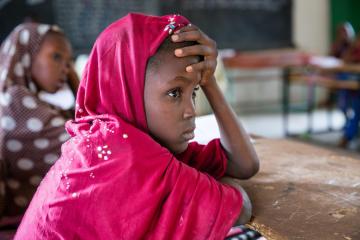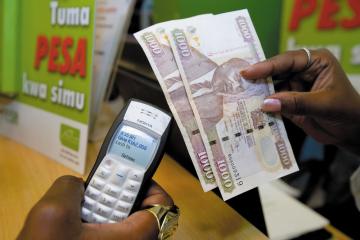Covid-19 Response at J-PAL Africa
J-PAL Africa is working with J-PAL affiliated researchers and partners to understand and mitigate the impact of the Covid-19 pandemic in the region.

The Covid-19 pandemic continues to take a toll on African lives and economies, leading the region into its first recession in 25 years. Recent estimates show that the pandemic could push up to 40 million people in Sub-Saharan Africa into extreme poverty. Acknowledging the need for strong policy action driven by evidence, J-PAL Africa has partnered with researchers and policy makers to provide insight into Covid-19-related policy challenges in several fields, from girls’ education to social protection.
Supporting efforts to keep girls enrolled in school
At the height of the pandemic, 85 percent of the world's students were at home due to school closures, and many have not yet returned. In sub-Saharan Africa, school closures impacted around 250 million students, adding to the 100 million out of school children before the pandemic, many in West Africa. Girls are particularly at risk of dropping out of school due to added domestic tasks to support struggling families and exposure to transactional relationships or early marriage.
To mitigate the added risks of school dropouts for girls, J-PAL Africa has been collaborating with researchers to disseminate evidence on interventions that can help boost school enrolment. For example, the team hosted a webinar in French, with J-PAL affiliated professor Pascaline Dupas (Stanford; Co-Chair, J-PAL’s Health sector), the World Bank’s Africa Gender Innovation Lab and the Cote D’Ivoire Ministry of Education, making evidence on enrolment available to a Francophone African audience. Read more on relevant evidence on girls’ enrolment in this blog. The team is currently collaborating with policy makers in West Africa to support the integration of evidence into policy design.
Generating evidence on digital social protection systems
The far-reaching economic and health consequences of the pandemic have catalyzed a worldwide increase in social protection measures to ensure at least a basic level of welfare.
In response to this, J-PAL Africa’s Digital Identification and Finance (DigiFI) funded studies in Kenya and Ghana to understand the role social protection measures, such as a universal basic income (UBI) and digital cash transfers, can play in increasing both household resilience and adherence to social distancing during a pandemic. DigiFI continues to fund research by J-PAL affiliates and African scholars on the impacts of digital IDs & payments. More information on the Request for Proposals here.
DigiFI is also disseminating evidence to inform the design of social protection to both respond to and build back better after the global pandemic. In October 2020, DigiFI’s chair Tavneet Suri was invited to the first annual event of the G7 Partnership on Women's Digital Financial Inclusion in Africa to share lessons from her research in Kenya on the impact of a UBI on food security as well as physical and mental health. Find a recap of key messages of the G7 meeting here.
Affiliates conduct rapid research to inform policymaking
Over the past year, J-PAL's affiliated researchers have been working across several African countries to collect data that can help inform the pandemic response on the continent. J-PAL affiliated researchers Dean Yang and Joshua Blumenstock, together with Oxford fellow Noam Angrist, were invited to share reflections on conducting Covid-19-relevant research at the Evidence Innovation Summit in Sydney on the 30th and 31st of March. View the event recording.
- Joshua Blumenstock has been supporting the Government of Togo in using a mix of machine learning, satellite imagery, and mobile phone data, to target social protection measures.
- Dean Yang has been working with the Ministry of Health in Mozambique to develop different types of messaging to encourage compliance to preventive behaviors like social distancing.
- Noam Angrist has been exploring how different low-tech, remote learning tools can stem the learning loss due to school closures.
Interested in this kind of support in your context? Please don’t hesitate to contact us or to follow us on Twitter and sign up for our newsletters to receive more information.


